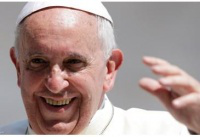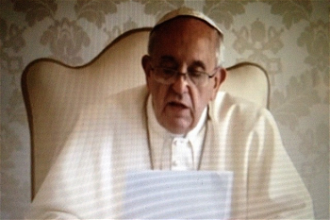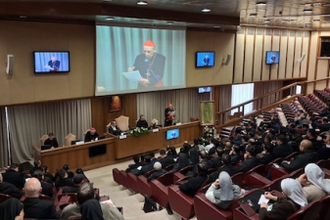Pope Francis visits Caserta, has private meeting with Evangelical community

Pope Francis made a short visit to the the city of Casterta on Saturday. During his stay he had a meeting with the diocesan priests and celebrated an open air Mass. On Monday he returned to the city for a private visit with the Evangelical community, and an old friend from his days as Archbishop of Buenos Aires, Pastor Giovanni Traettino.
During his meeting with the priests on Saturday, Pope Francis set aside aside his prepared text he spoke off the cuff, answering four questions they presented to him. The Holy Father said bishops must set an example of the unity that Jesus asked of His Father for the Church. “This cannot be done speaking badly about each other. The unity of bishops is important to the unity of the Church”, he said, adding that the devil revels in and profits from internal conflict. “The bishops must be in agreement in unity, but not in uniformity. Each one has his charism, each one has his way of thinking and his point of view; this is at times the result of mistakes, but it is often the result of the Spirit … a unity in diversity, in which no-one loses his own personality”.
The Pope was asked for suggestions for pastoral outreach that relaunches the primacy of the Gospel without diminishing popular piety. He answered that “true popular piety was born of that Sensus Fidei described in the Encyclical Lumen Gentium and which is guided by devotion to the Saints, to the Virgin, and also by folkloric expressions, in the positive sense of the word”. He added, “the agnosticism that has entered into the Church in groups of intimist piety” are not good, but are instead a form of heresy. … Popular piety is inculturated, it cannot be produced in a laboratory, aseptic … it is always born of life”.
Another question focused on the identity of the priest in the third millennium. “How can we overcome the existential crisis born of the linguistic, semantic and cultural revolution in evangelical witness?”. “With creativity”, replied the Pope. “It is the commandment that God gave to Adam and Jesus to his disciples. And creativity is found in prayer. A bishop who does not pray, a priest who does not pray, has closed the door to creativity”.
The fourth question related to the foundations of spirituality for a priest. Francis described the priest's dual capacity for contemplation: towards God and towards man. “He is a man who looks, who fills his eyes and heart with contemplation: with the Gospel before God, and with human problems when among men. The priest must be contemplative in this way. But this must not be confused with monastic life, which is something else”.
Pope Francis emphasised that diocesan life must be at the centre of the spirituality of the diocesan priest. “Maintaining a relationship with the bishop and with the rest of the priests … simple, but at the same time not easy. The greatest enemy of these relationships is gossip. The devil knows that this seed bears fruit, and he sows it well ... to impede that evangelical, spiritual and fruitful relationship between the bishop and the presbytery”. He remarked that it was better to say things clearly and openly, rather than give satisfaction to the devil who in this way “attacks the centre of the spirituality of the diocesan clergy”. The Holy Father concluded with some comments on the bitterness of some priests and the image of an angry Church. “One may anger at times; it is healthy to be angry at times. But the state of rage is not God's, and leads only to sadness and disunity”.
More than two hundred thousand people attended the Mass celebrated by the Holy Father in the square in front of the Royal Palace of Caserta on Saturday evening.
The Pope spoke in his homily about the “kingdom of Heaven”, based on the parables of the hidden treasure and the pearl. In the first, the “kingdom” is similar the treasure hidden in a field, that the farmer finds and hides again, full of joy, then sells everything he has to buy the field. In the second, a merchant who seeks fine pearls encounters one of great value and sells everything he owns in order to buy it.
The farmer and the merchant, explains the Pope, have the same sentiment in common: the surprise and joy of the fulfilment of their desires and, through these two parables, “with simple words that everyone can understand”, Jesus explains what the kingdom of heaven is, how it is found and what one can do to obtain it.
Jesus does not concern Himself with describing the “kingdom”, although He has announced it since the beginning of His Gospel; however, He shows it indirectly, through reflection. “He prefers to let it be understood through parables and similarities, especially by revealing its effects: the kingdom of Heaven is able to change the world, like the leaven concealed in the dough”. Both parables help us understand that the kingdom of God is present in the person of Jesus Himself. He is the hidden treasure and the valuable pearl. The joy of the farmer and the merchant are comprehensible – they have found what they sought! It is the joy of each one of us when we discover the closeness and the presence of Jesus in our life. His is a presence that transforms our existence and opens us to the needs of our brethren; a presence that invites us to welcome every other presence, even that of the foreigner or the immigrant”.
To encounter the kingdom of God, each one of us takes his or her own path. For some, the encounter with Jesus is awaited, hoped for and long sought, as we see in the parable of the merchant who travels the world seeking something of value. For others it happens unexpectedly, almost by chance, as in the parable of the farmer. This reminds us that God lets us meet Him anyway, as it is He Who is the first to wish to meet us. ... He came in order to be 'God with us'. … It is He Who seeks us out, it is He Who lets Himself be found even by those who are not looking for Him, at times in unusual places and at unexpected moments. When we find Jesus we are fascinated, we are won over, and it is a joy to leave behind our usual way of life, often arid and apathetic, to embrace the Gospel, and to allow ourselves to be guided by the new logic of love”.
Jesus is very clear that when He refers to the possession of the “kingdom”, enthusiasm and the joy of discovery are not enough. “It is necessary to place the precious pearl of the kingdom before all other earthly goods; it is necessary to put God in first place in our life. According primacy to God means having the courage to say no to evil, to violence, to oppression; to live a life of service to others and in favour of legality and the common good. … One must be a friend of God, love one's brothers, and be committed to the protection of their lives and health, also respecting the environment and nature”. Francis emphasised, “This is particularly important in this beautiful land, which needs to be protected and preserved; it takes courage to say no to every form of corruption and illegality – and we all know the name of these forms of corruption and illegality. It requires that everyone is a servant to the truth and assumes in every situation an evangelical lifestyle, which is manifested in the gift of the self and care for the poor and excluded”.
The Pope went on to speak about the festivity of St Ann, the patron saint of Caserta, which brought together in the square several components of the diocesan community, the bishop, the civil authorities and the representatives of various social sectors. “I would like to encourage al of you to experience the festivity of your patron saint free of preconceived ideas, as a pure expression of the faith of a people who recognise themselves as the family of God and strengthen the bonds of fraternity and solidarity. St. Ann perhaps heard her daughter pronounce the words of the Magnificat: 'He has brought down rulers from their thrones, but has lifted up the humble; He has filled the hungry with good things'. May she help you to find the only treasure, Jesus, and teach you to discover the criteria of God's action: He turns worldly judgements on their head, coming to the aid of the poor and the least among us, and brings abundance to the humble, who entrust their existence to Him. Have hope, hope does not disappoint. And I like to repeat to you: do not let yourselves be robbed of hope!”
Following the Mass and before the final blessing, Francis gave thanks to all those present for their warm welcome, and to Cardinal Crescenzio Sepe, archbishop of Naples, adding, “I have heard that the Neapolitans are a little jealous of this visit, but I wish to assure them them that this year I will certainly visit them too”.
On Monday Pope Francis returned to Caserta on Monday for a private visit to the Pentecostal community known as the Evangelical Church of Reconciliation. The Pope first met the founder of the community, Pastor Giovanni Traettino, during his time as archbishop of Buenos Aires and over the past year he has met and received groups of Pentecostals at his Santa Marta residence here in the Vatican.
After greeting the pastor and his family, Pope Francis was welcomed by over 200 Evangelicals who had travelled to Caserta from around Italy, as well as from the US and South America.
Calling the Pope, my beloved brother, Rev Traettino said the Evangelical community was deeply grateful for the visit which would have been unthinkable until very recently. Many Evangelicals, he said, pray daily for the Pope and see his election as the work of the Holy Spirit.
Pardon and reconciliation were the themes at the heart of the Pope’s words as, to loud applause he asked forgiveness for the words and actions of Catholics who have persecuted Pentecostals in the past
All of us are sinners, the Pope stressed, but all of us must continue to walk boldly in the presence of Our Lord. Quoting from St Paul’s letter to the Corinthians, Pope Francis spoke of the diversity of the Body of Christ but he stressed that diversity is reconciled to unity through the action of the Holy Spirit.
Following the meeting, Pope Francis then had lunch with members of the Pentecostal community in Caserta and returned by helicopter to the Vatican later on Monday afternoon
Source: VIS
















